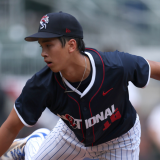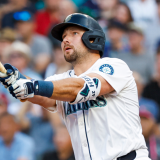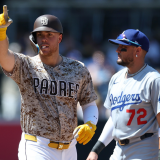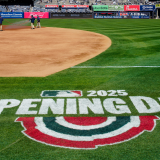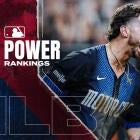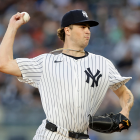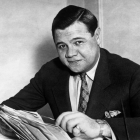
How James Wood became a stabilizing force in the Nationals' season of upheaval by 'sticking to' his plan
Wood, still just 22 years old, has provided a rare spark of light for the NL East bottom-dwellers
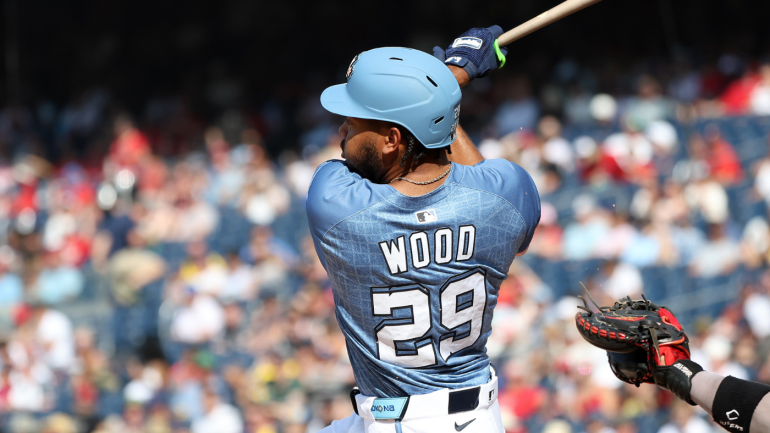
ATLANTA — Scott Boras stood in between his two clients in a beige suit jacket and skin-tight jeans Monday afternoon. He peered to his right and his left, flanked by MacKenzie Gore and James Wood, both of whom were set to play in their first All-Star Game. They represented the core of a young Nationals team, but also an another extension of his tree of budding superstars.
Boras always gives himself reason to gloat about the players he represents. He's seen a young Alex Rodriguez take the league by storm. He done deals for Barry Bonds and Manny Ramirez. He's seen bright-eyed kids become all-time fearless greats. He knows the beginning arc of what superstardom looks like.
Gore has proven himself to be a front-of-the-line starter with a 3.02 ERA in 19 starts, fanning 138 batters in 110 ⅓ innings pitched.
Wood is different. Players like him don't come around very often.
"They really don't," Boras told CBS Sports.
In a season of turmoil, Wood serves as this team's beacon of light. For now, at least. The outfielder just came off his first All-Star appearance and has launched himself into categories with some of the best hitters in baseball. He put together a monster first half, slashing .278/.381/.534 with a .915 OPS and 22 homers -- the same as his age. He already has a 4.4 bWAR. Washington's seen the likes of Bryce Harper and Juan Soto sink their cleats into its dirt. Wood is in that territory now. Same stage, same expectations, same potential.

Selected in the second round of the 2021 Draft by the Padres, Wood was a part of the blockbuster return in the 2023 Juan Soto trade to San Diego. In hindsight, it might go down as the best haul ever for a superstar, netting not just Wood, but also Gore and C.J. Abrams. Abrams, a first-time All-Star last season, is slashing .287/.353/.483 with an .836 OPS and 12 homers.
"We couldn't believe that James was a guy that was going to be taken 62nd overall," Boras said. "And I give [Padres president of baseball operations] AJ Preller and his staff in San Diego all the credit in the world for recognizing that. And also [former Nationals president of baseball operations] Mike Rizzo and his staff for recognizing it when they want to determine who their next franchise players are."
That core of Wood, Gore and Abrams is what the Nationals are hanging their hopes on as they languish in the basement of the NL East. It's a trio that could serve as building blocks for a return to contention if all goes well -- which is hardly guaranteed. But even then, Wood is in his own stratosphere.
"I look at kind of the stoicness of him," said Phillies All-Star Kyle Schwarber. "He's a guy who is calm. He's not gonna let things bother him. And obviously he's got all the tools, right? He's got the power, he's got the arm, he's got the speed. I've been really impressed playing with him.
Wood is soft in voice, but not in power. He ranks at the top of the league in average exit velocity (93.6 miles per hour). To put that in perspective, just Oneil Cruz, Aaron Judge, Shohei Ohtani, Soto, Schwarber, and Matt Olson rank ahead of him. Wood, who is 6-foot-7, 234 pounds, can move, too, running in the 70th percentile, above league average. But the bat is the separator. That's where he gets loud. His bat speaks. You have to come to him, too. He chases at just a 23.6% clip, well above a league average that hovers around 30%.
"I mean, I think the biggest thing for me [this year] is just not giving away at-bats" Wood told CBS Sports. "I just think going up there with the plan and whatever that plan is, just being committed to it and sticking to it. I think that's made a big difference for me."
It should be easy to picture Wood as the face of the franchise moving forward. He's from Olney, Maryland -- just 20 or so miles up the road, north of D.C. He spent his first two years of high school at St. John's College High, right in the city. This isn't just where he plays. It's home. But the Nationals let both Harper and Soto walk out the door, one to free agency, one by trade. Two generational talents who, eventually, got paid handsomely by division rivals. They, too, are Boras clients. The Nats have a directional problem, too. Rizzo was recently ousted from his front office post, and Davey Martinez was shown the door, too, leaving the franchise without a steady hand in the manager's chair or the front office. The draft hasn't been their friend either.
Did Rizzo's firing surprise Boras?
"No," he answered. "Because I think if you look at every No. 1 draft pick that we've had in Washington, whether it be [Stephen] Strasburg ... or Harper, they turned out to be who they're supposed to be. And I give Rizzo credit for understanding that about the players. But when you don't [invest in the draft], you suffer. These drafts turn out to be the foundation of a world championship in Washington. So, when you don't take the best players available, and you move money south rather than north to sign them, I can fundamentally show you in the draft, that's usually a monstrous mistake."
It's unclear if the Nationals plan to try to extend Wood on a long-term deal -- or if they've already broached the topic. Boras won't put a number on what he thinks Wood might get. It's too far down the line. Too hard to predict.
"You don't really talk about markets when a player is in a performance model," Boras said. "All I know is that James is doing things at his age that few players do. And when you see that, that's kind of what Soto did at a young age. But you have to do it repetitively. You have to do it for a number of years. I don't ever talk about markets because we want the players just to focus on their performance."
So far, Wood has been performing in his own heavyweight class.



